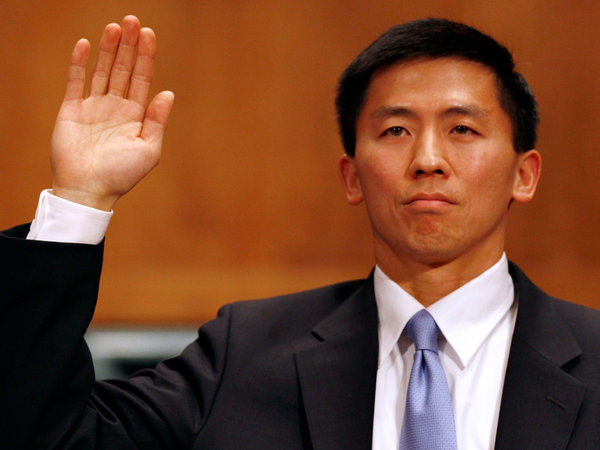Goodwin Liu nominated to CA high court
Updated: 2011-07-27 11:03
(Agencies)
|
|||||||||||
|
 University of California at Berkley Law Professor Goodwin Liu swears an oath of truth before testifying to the Senate Judiciary Committee during his confirmation hearing to be US Circuit Judge for the Ninth Circuit April 16, 2010 in Washington, DC. But Liu failed to get 60 votes to end debate on his nomination on May 19. [Photo/CFP]
|
Goodwin Liu would become the fourth serving justice of Asian descent if confirmed for the state Supreme Court.
Gov Jerry Brown, a Democrat, said he didn't buy into Republican criticism faced by Liu, a University of California, Berkeley law professor, after he was nominated by President Barack Obama for the 9th US Circuit Court of Appeals.
In fact, Brown said the high-profile failure of Liu's nomination propelled him to the top of Brown's list for the California Supreme Court vacancy.
Brown called Liu "an extraordinary man and a distinguished legal scholar" who is battle-tested to win confirmation after being closely vetted and cleared by the Obama administration and "attacked by the best and sharpest politicians in the country."
It was Brown's first judicial nomination since taking office in January. Liu would replace Carlos Moreno, who stepped down in February to go into private practice.
After his nomination by Obama, Liu, 40, picked up support from some notable conservatives such as former US Solicitor General Ken Starr, who viewed him as a rising legal scholar. But his nomination was blocked by Republicans, who objected to Liu's written positions and said he was too inexperienced for the post.
Specifically, some Republican senators took exception to written testimony Liu submitted in 2006 opposing the confirmation of conservative judge Samuel Alito, who went on to win an appointment to the US Supreme Court.
Liu wrote that Alito was "at the margin, not the mainstream," as an appellate judge unworthy of appointment to the high court.
"Judge Alito's record envisions an America where police may shoot and kill an unarmed boy to stop him from running away with a stolen purse," Liu wrote.
During his own confirmation process before the US Senate, Liu agreed with Republican Sen. Tom Coburn that submitting that type of testimony "was a case of poor judgment."
Liu said he should have omitted that paragraph from his written testimony.
A few Republican senators also said they were troubled by Liu joining 16 other law professors who in 2007 urged the California Supreme Court to strike down the state's gay marriage ban.
The state Supreme Court did end the ban, but later upheld a voter-approved initiative to reinstate it.
In the end, Liu could muster only one Republican vote in the US Senate and a total of 53 votes when 60 were needed to bring his confirmation to a vote. He withdrew his candidacy in May, nearly a year after the president's nomination.
Liu was born in Georgia and grew up in Sacramento, where he attended public schools.
He graduated from Yale Law School in 1998 after attending Stanford University as an undergraduate. He clerked for US Supreme Court Justice Ruth Bader Ginsberg and worked as an appellate litigator in Washington before joining the UC Berkeley faculty in 2003.
Moreno was the only Latino on the court, and influential Latino legal groups had urged Brown to nominate another.
"I don't think people should be appointed because of national origin," Brown said. "Their attributes should in every way be the dominant criteria."
Victor Acevedo, president of the Mexican-American Bar Association, called Brown's comments "disingenuous" and maintained national origin is always taken into account for candidates because background is an important consideration.
"We are very disappointed," Acevedo said. "We are the largest minority in the state and almost a majority, and now we have no representation on the court."
Liu has never served as a judge. Brown, however, said that lack of experience will add to the diversity of the California Supreme Court, where the six sitting justices all served on lower courts before their appointments. The six are also all Republican appointees.